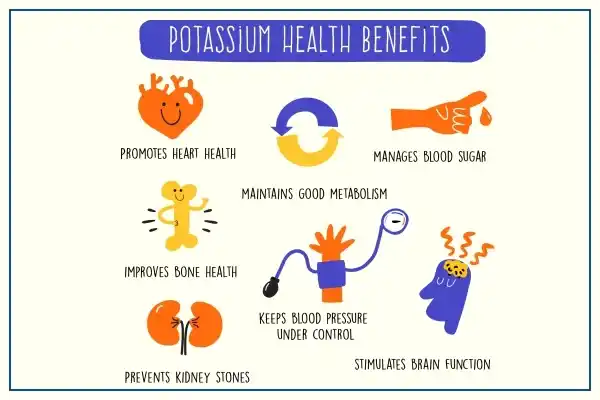What is Potassium?
Potassium is a mineral found in the foods you eat. It is also an electrolyte. Electrolytes conduct electrical impulses throughout the body. They help in a variety of essential body functions, including:
- Blood pressure
- Normal water balance
- Muscle contractions
- Nerve impulses
- Digestion
- Heart rate
- pH balance (acidity and alkalinity)
Your body does not produce potassium naturally. Therefore, it is important to consume the right balance of potassium-rich foods and drinks. Potassium deficiency can result in severe health problems. However, ingesting too much can cause temporary or long-term health problems. Natural potassium levels in the body are maintained by healthy kidneys.

Recommended Intake
An adequate intake of potassium is 3,400 milligrams (mg) per day for healthy adult men and 2,600 mg per day for healthy adult women. The following table shows specific recommendations for different age groups.
| 0–6 months | 400 mg/day | 400 mg/day |
| 7–12 months | 860 mg/day | 860 mg/day |
| 1–3 years | 2,000 mg/day | 2,000 mg/day |
| 4–8 years | 2,300 mg/day | 2,300 mg/day |
| 9–13 years | 2,500 mg/day | 2,300 mg/day |
| 14–18 years. | 3,000 mg/day | 3,000 mg/day |
| 19+ years | 3,400 mg/day | 3,400 mg/day |
The adequate intake during pregnancy is 2,900 mg and 2,800 mg during lactation. A person should aim to obtain their potassium from a healthy, balanced diet that provides a variety of vitamins and minerals. In some circumstances, a doctor may recommend supplements.
Potassium For The Body
Your Heart And Other Muscles
A key job for potassium involves the electrical signals sent by the muscles. It allows them to contract properly. If you are low in potassium, you may suffer from muscle weakness and cramps. Because it is a muscle, your heart needs potassium. It helps cells send the proper electrical signals for the heart to pump properly. Having too much potassium in your body can disrupt your heart rate.
Potassium And The Kidneys
Normally, the kidneys are the body's exit chute for excess potassium and send it out into the urine. But in people with chronic kidney disease, potassium can build up and levels can become dangerously high.
Potassium And The Nerves And The Brain
Potassium helps nerves fire properly so they respond to stimulation. Again, this happens through electrical signals that travel from one cell to another. As part of the nervous system, your brain also needs potassium. The mineral allows brain cells to communicate with each other and with cells that are further away. Changes in potassium levels have been linked to learning, hormone release, and metabolism.
Potassium Deficiency
Certain conditions can cause potassium deficiencies or hypokalemia. These include:
- Kidney disease
- Excessive use of diuretics
- Excessive sweating, diarrhea, and vomiting.
- Magnesium deficiency
- Use of antibiotics, such as carbenicillin and penicillin.
The symptoms of hypokalemia are different depending on the severity of your deficiency. A temporary decrease in potassium may not cause any symptoms. For example, if you sweat a lot from intense training, your potassium levels may return to normal after eating or drinking electrolytes before any damage occurs. However, serious deficiencies can be life-threatening. Signs of a potassium deficiency include:
- Extreme fatigue
- Muscle spasms, weakness, or cramps
- Irregular heartbeat
- Constipation, nausea, or vomiting
Hypokalemia is usually diagnosed with a blood test. Your doctor may also order an EKG of your heart and an arterial blood gas test to measure the pH levels in your body.
Food Sources of Potassium
Many of the foods you already eat contain potassium. Potassium-rich foods include those mentioned below. Choose nutritious foods from the list below to add to your menu if you need to improve the amount of potassium in your diet. Many fresh fruits and vegetables are rich in potassium:
- Bananas, oranges, cantaloupe, molasses, apricots, grapefruits (some dried fruits, such as prunes, raisins, and dates, are also high in potassium)
- Cooked Spinach
- Cooked Broccoli
- Potatoes
- Sweet Potatoes
- Mushrooms
- Peas
- Cucumbers
- Zucchini
- Pumpkins
- Green Leafy Vegetables
Potassium-rich fruit juice is also a good option:
- Orange Juice
- Tomato Juice
- Plum Juice
- Apricot Juice
- Grapefruit Juice
Certain dairy products, such as milk and yogurt, are high in potassium (low-fat or fat-free is best). Some fish contain potassium:
- Tuna
- Halibut
- Cod
- Trout
- Rockfish
Beans or legumes that are high in potassium include:
- Lima Beans
- Pinto Beans
- Beans
- Soy
- Lentils
Other foods high in potassium include:
- Salt Substitutes
- Molasses
- Walnuts
- Meat and Poultry
- Brown and Wild Rice
- Bran Cereal
- Pasta and Whole Wheat Bread

